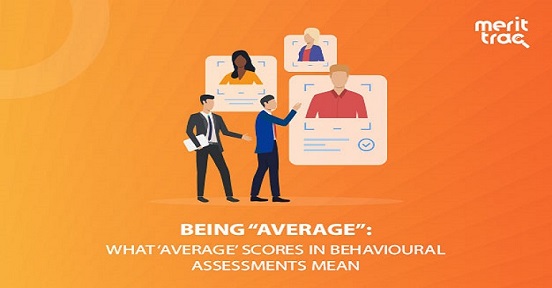
Being “Average”: What ‘Average’ Scores in Behavioural Assessments Mean
Date: 09/01/2020 | Posted by: Meghana Jitendra, Psychometrician | Category: Behavioural Assessment , Corporate
One can find enough motivational speeches and inspiring quotes on being high performers. After all, it seems that high performers are rewarded for outperforming the others, which is mostly true. But, does that mean that being ‘average’ is not good enough? As against all popular media glorifying the extremes of the normal probability curve, my answer is “not necessarily”.
In the area of behavioural and personality assessments, falling in the ‘average’ category of scores is not unfulfilling. In fact, falling in the ‘average’ range/category of scores on behavioural test is sometimes better than scoring 'high'.
Before I discuss how being ‘Average’ is okay, let’s understand what actually is ‘high’, ‘average’ or ‘low’. These categories are referenced to a population distribution, or against a pre-determined set of criteria. The point to note here is that these categories without qualitative insights and interpretation are meaningless.
Average means Enough
“Too much is too bad” can be applied to personality traits and behavioural competencies with certain caution. While we are socialised to believe that high scores are always the best, 'High' scoring category may also include dysfunctional behaviours and traits. For example, being highly empathetic may lead to identity diffusion, being highly agreeable may leave little space for one’s own authentic opinions, being highly tolerant of stress might not help in identifying signs of burnout in one’s own life, being highly humble can get self-abasing and lead to a negative self-view. The list can go on. Extremes can be dangerous, be it the left of the curve or right. From this perspective, being ‘average’ doesn’t seem so bad! Average of any trait can mean enough of the trait for healthy functioning, be it enough empathy to help someone but not get lost in their misery, or enough stress tolerance to handle pressure, but also realising when to take a break.
Average means Balance
Personality traits often lie on a spectrum, and being ‘average’ can mean having the best of both worlds, low and high. For example, if you score ‘average’ on a test of Introversion-extroversion, you’d probably be an ambivert, enjoying alone-time when you need to recharge your energy, and socialising when you want to make the best of your people-skills. Average is optimum; you can remain in your comfort zone and perform, but also push yourself to explore different aspects of yourself and the world.
Average means Contextualising
Descriptive reports on ‘Average’ scores on behavioural assessments are often accompanied by the phrase “Situational factors greatly influence how the behavioural trait is expressed.” While every trait interacts with the environment in its expression in terms of a response, having an ‘average’ degree of a trait gives more room for the interplay of behavioural traits with situational factors, contextualising the expression of the trait in the responses of the individual. Contextualising is this manner may prove to be more effective in responding to the environment, optimising the behavioural trait. For example, for someone with an ‘average’ openness to experience, the trait would express itself differently in different situations, contextualising the response to aspects of risk, viability, effort, etc. The individual might be very open to trying a new dish, but may think thoroughly before a drastic career change.
Average means Potential
‘Average’ can indicate the individual’s potential in terms of that behavioural trait or competency. Being ‘average’ can mean that you can develop the behavioural competency further. Conscious effort and right kind of learning can help shape the behavioural competency in the desired direction; and traits with ‘average’ levels lend themselves to change more easily than the extremes. An ‘average’ level of a behavioural competency shows that the individual has a foundational level of that competency, as well as the potential to do better. And even if the result of the learning is an average improvement, it is fine, because it’s still in progress. As Mark Manson points out, “Mediocrity, as a goal, sucks. But mediocrity, as a result, is OK.”
While it’s great to be the Master of something, being the jack of trades has wider utility, after all!












 Sales Hotline: USA: +1 646 916 0939 / Others: +91 80619 14700
Sales Hotline: USA: +1 646 916 0939 / Others: +91 80619 14700


